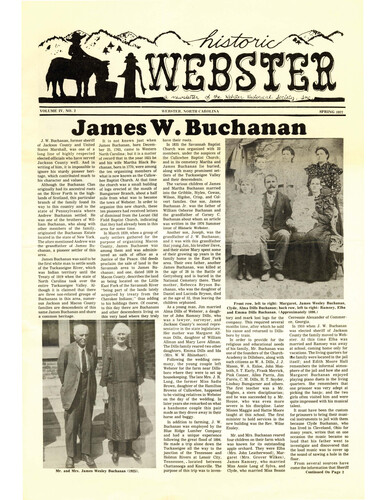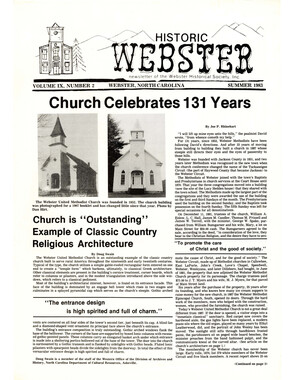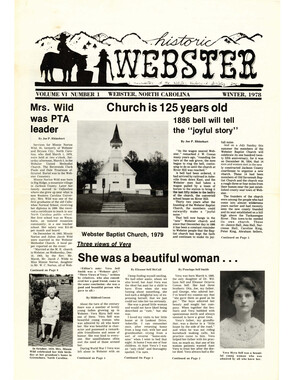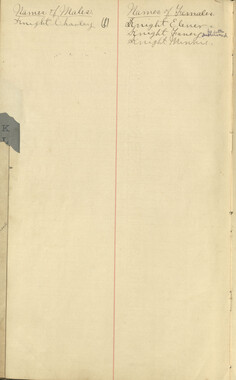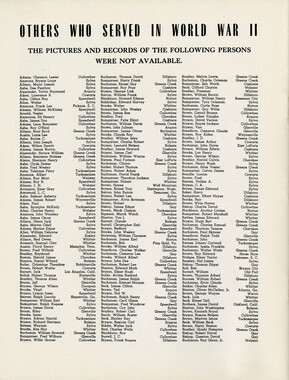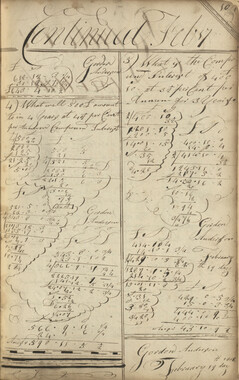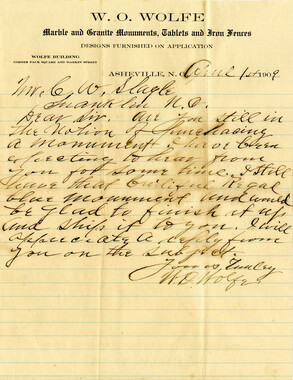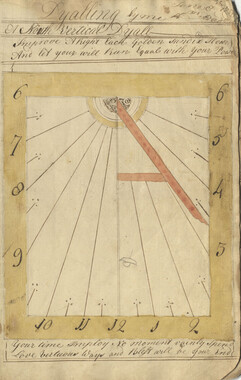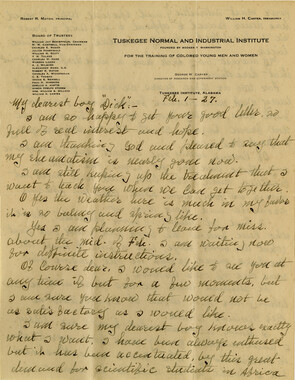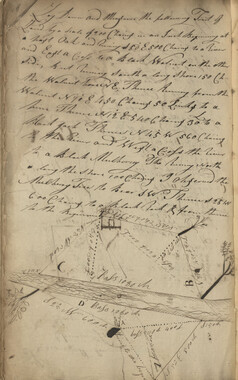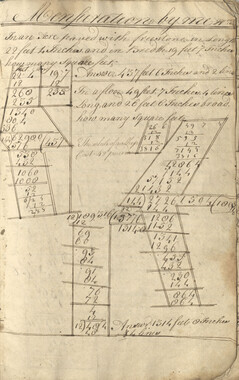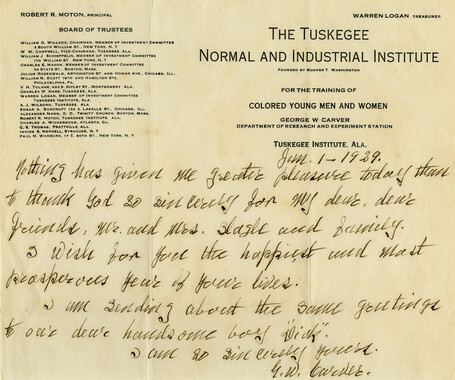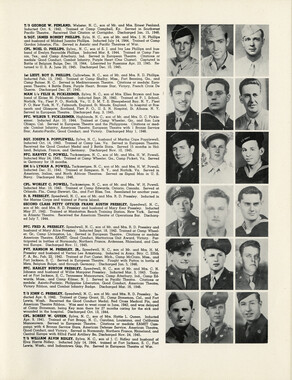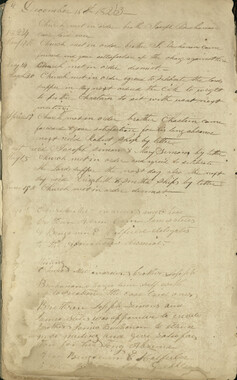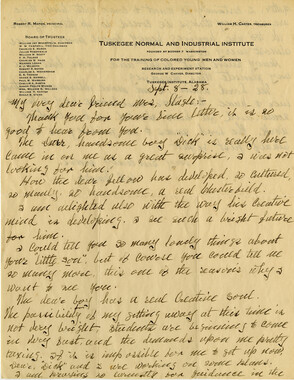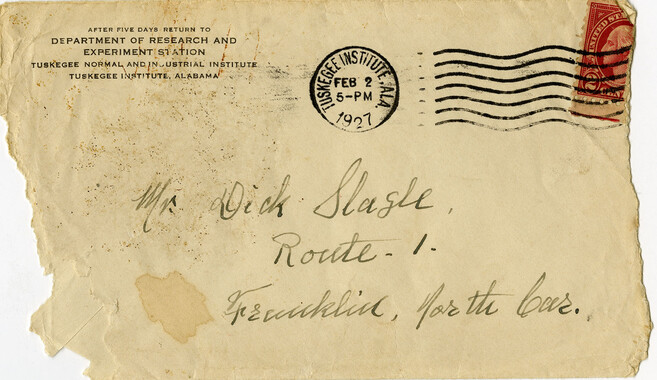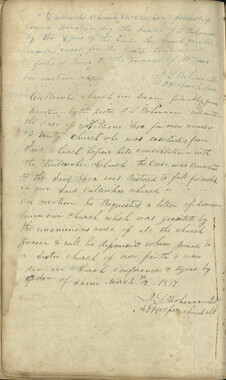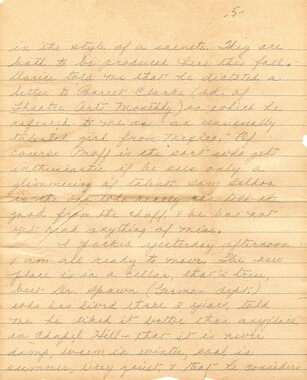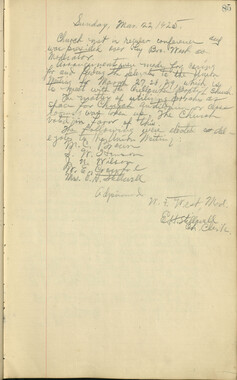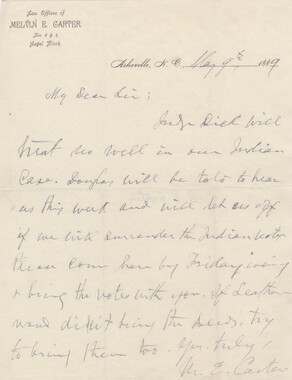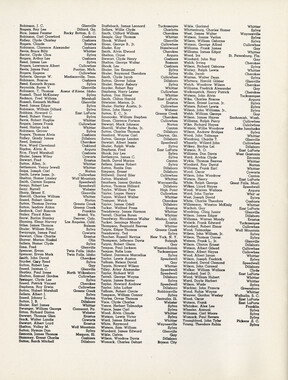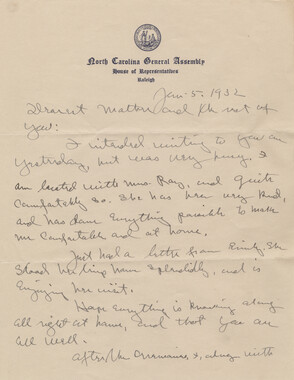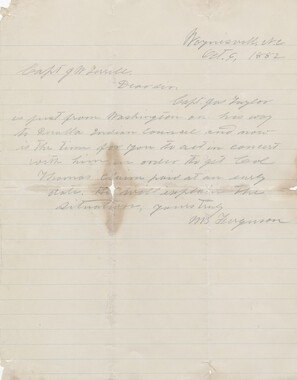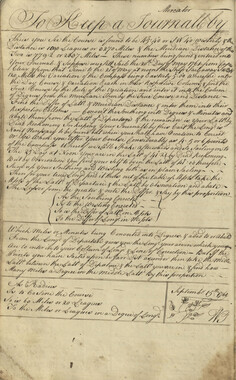Western Carolina University (21)
View all
- Canton Champion Fibre Company (2308)
- Cherokee Traditions (291)
- Civil War in Southern Appalachia (165)
- Craft Revival (1942)
- George Masa Collection (137)
- Great Smoky Mountains - A Park for America (3182)
- Highlights from Western Carolina University (422)
- Horace Kephart (998)
- Journeys Through Jackson (159)
- LGBTQIA+ Archive of Jackson County (90)
- Oral Histories of Western North Carolina (318)
- Picturing Appalachia (6617)
- Stories of Mountain Folk (413)
- Travel Western North Carolina (153)
- Western Carolina University Fine Art Museum Vitreograph Collection (129)
- Western Carolina University Herbarium (92)
- Western Carolina University: Making Memories (738)
- Western Carolina University Publications (2491)
- Western Carolina University Restricted Electronic Theses and Dissertations (146)
- Western North Carolina Regional Maps (71)
- World War II in Southern Appalachia (131)
University of North Carolina Asheville (6)
View all
- Allanstand Cottage Industries (62)
- Appalachian National Park Association (53)
- Bennett, Kelly, 1890-1974 (1463)
- Berry, Walter (76)
- Brasstown Carvers (40)
- Carver, George Washington, 1864?-1943 (26)
- Cathey, Joseph, 1803-1874 (1)
- Champion Fibre Company (233)
- Champion Paper and Fibre Company (297)
- Cherokee Indian Fair Association (16)
- Cherokee Language Program (22)
- Crowe, Amanda (40)
- Edmonston, Thomas Benton, 1842-1907 (7)
- Ensley, A. L. (Abraham Lincoln), 1865-1948 (275)
- Fromer, Irving Rhodes, 1913-1994 (70)
- George Butz (BFS 1907) (46)
- Goodrich, Frances Louisa (120)
- Grant, George Alexander, 1891-1964 (96)
- Heard, Marian Gladys (60)
- Kephart, Calvin, 1883-1969 (15)
- Kephart, Horace, 1862-1931 (313)
- Kephart, Laura, 1862-1954 (91)
- Laney, Gideon Thomas, 1889-1976 (439)
- Masa, George, 1881-1933 (61)
- McElhinney, William Julian, 1896-1953 (44)
- Niggli, Josephina, 1910-1983 (10)
- North Carolina Park Commission (105)
- Osborne, Kezia Stradley (9)
- Owens, Samuel Robert, 1918-1995 (11)
- Penland Weavers and Potters (36)
- Roberts, Vivienne (15)
- Roth, Albert, 1890-1974 (142)
- Schenck, Carl Alwin, 1868-1955 (1)
- Sherrill's Photography Studio (2565)
- Southern Highland Handicraft Guild (127)
- Southern Highlanders, Inc. (71)
- Stalcup, Jesse Bryson (46)
- Stearns, I. K. (213)
- Thompson, James Edward, 1880-1976 (226)
- United States. Indian Arts and Crafts Board (130)
- USFS (683)
- Vance, Zebulon Baird, 1830-1894 (1)
- Weaver, Zebulon, 1872-1948 (58)
- Western Carolina College (230)
- Western Carolina Teachers College (282)
- Western Carolina University (2008)
- Western Carolina University. Mountain Heritage Center (18)
- Whitman, Walt, 1819-1892 (10)
- Wilburn, Hiram Coleman, 1880-1967 (73)
- Williams, Isadora (3)
- Cain, Doreyl Ammons (0)
- Crittenden, Lorraine (0)
- Rhodes, Judy (0)
- Smith, Edward Clark (0)
- Appalachian Region, Southern (3032)
- Asheville (N.C.) (1945)
- Avery County (N.C.) (26)
- Blount County (Tenn.) (200)
- Buncombe County (N.C.) (1680)
- Cherokee County (N.C.) (283)
- Clay County (N.C.) (556)
- Graham County (N.C.) (247)
- Great Smoky Mountains National Park (N.C. and Tenn.) (535)
- Haywood County (N.C.) (3573)
- Henderson County (N.C.) (70)
- Jackson County (N.C.) (4926)
- Knox County (Tenn.) (61)
- Knoxville (Tenn.) (21)
- Lake Santeetlah (N.C.) (14)
- Macon County (N.C.) (421)
- Madison County (N.C.) (216)
- McDowell County (N.C.) (39)
- Mitchell County (N.C.) (135)
- Polk County (N.C.) (35)
- Qualla Boundary (982)
- Rutherford County (N.C.) (78)
- Swain County (N.C.) (2187)
- Transylvania County (N.C.) (270)
- Watauga County (N.C.) (12)
- Waynesville (N.C.) (86)
- Yancey County (N.C.) (72)
- Aerial Photographs (3)
- Aerial Views (60)
- Albums (books) (4)
- Articles (1)
- Artifacts (object Genre) (228)
- Bibliographies (1)
- Biography (general Genre) (2)
- Cards (information Artifacts) (38)
- Clippings (information Artifacts) (193)
- Copybooks (instructional Materials) (3)
- Crafts (art Genres) (622)
- Depictions (visual Works) (21)
- Design Drawings (1)
- Digital Moving Image Formats (2)
- Drawings (visual Works) (185)
- Envelopes (115)
- Exhibitions (events) (1)
- Facsimiles (reproductions) (1)
- Fiction (general Genre) (4)
- Financial Records (12)
- Fliers (printed Matter) (67)
- Glass Plate Negatives (381)
- Guidebooks (2)
- Internegatives (10)
- Interviews (823)
- Land Surveys (102)
- Letters (correspondence) (1070)
- Manuscripts (documents) (618)
- Maps (documents) (177)
- Memorandums (25)
- Minutes (administrative Records) (59)
- Negatives (photographs) (6192)
- Newsletters (1290)
- Newspapers (2)
- Notebooks (8)
- Occupation Currency (1)
- Paintings (visual Works) (1)
- Pen And Ink Drawings (1)
- Periodicals (194)
- Personal Narratives (10)
- Photographs (12977)
- Plans (maps) (1)
- Poetry (6)
- Portraits (4573)
- Postcards (329)
- Programs (documents) (181)
- Publications (documents) (2444)
- Questionnaires (65)
- Relief Prints (26)
- Sayings (literary Genre) (1)
- Scrapbooks (282)
- Sheet Music (2)
- Slides (photographs) (402)
- Songs (musical Compositions) (2)
- Sound Recordings (802)
- Specimens (92)
- Speeches (documents) (18)
- Tintypes (photographs) (8)
- Transcripts (329)
- Text Messages (0)
- A.L. Ensley Collection (275)
- Appalachian Industrial School Records (7)
- Appalachian National Park Association Records (336)
- Axley-Meroney Collection (2)
- Bayard Wootten Photograph Collection (20)
- Bethel Rural Community Organization Collection (7)
- Blumer Collection (5)
- C.W. Slagle Collection (20)
- Canton Area Historical Museum (2110)
- Carlos C. Campbell Collection (564)
- Cataloochee History Project (64)
- Cherokee Studies Collection (4)
- Daisy Dame Photograph Album (5)
- Daniel Boone VI Collection (1)
- Doris Ulmann Photograph Collection (112)
- Elizabeth H. Lasley Collection (1)
- Elizabeth Woolworth Szold Fleharty Collection (4)
- Frank Fry Collection (95)
- George Masa Collection (173)
- Gideon Laney Collection (452)
- Hazel Scarborough Collection (2)
- Hiram C. Wilburn Papers (28)
- Historic Photographs Collection (236)
- Horace Kephart Collection (861)
- Humbard Collection (33)
- Hunter and Weaver Families Collection (1)
- I. D. Blumenthal Collection (4)
- Isadora Williams Collection (4)
- Jesse Bryson Stalcup Collection (47)
- Jim Thompson Collection (224)
- John B. Battle Collection (7)
- John C. Campbell Folk School Records (80)
- John Parris Collection (6)
- Judaculla Rock project (2)
- Kelly Bennett Collection (1482)
- Love Family Papers (11)
- Major Wiley Parris Civil War Letters (3)
- Map Collection (12)
- McFee-Misemer Civil War Letters (34)
- Mountain Heritage Center Collection (4)
- Norburn - Robertson - Thomson Families Collection (44)
- Pauline Hood Collection (7)
- Pre-Guild Collection (2)
- Qualla Arts and Crafts Mutual Collection (12)
- R.A. Romanes Collection (681)
- Rosser H. Taylor Collection (1)
- Samuel Robert Owens Collection (94)
- Sara Madison Collection (144)
- Sherrill Studio Photo Collection (2558)
- Smoky Mountains Hiking Club Collection (616)
- Stories of Mountain Folk - Radio Programs (374)
- The Reporter, Western Carolina University (510)
- Venoy and Elizabeth Reed Collection (16)
- WCU Gender and Sexuality Oral History Project (36)
- WCU Mountain Heritage Center Oral Histories (25)
- WCU Oral History Collection - Mountain People, Mountain Lives (71)
- WCU Students Newspapers Collection (1923)
- Western North Carolina Tomorrow Black Oral History Project (69)
- William Williams Stringfield Collection (2)
- Zebulon Weaver Collection (109)
- African Americans (390)
- Appalachian Trail (35)
- Artisans (521)
- Cherokee art (84)
- Cherokee artists -- North Carolina (10)
- Cherokee language (21)
- Cherokee pottery (101)
- Cherokee women (208)
- Church buildings (190)
- Civilian Conservation Corps (U.S.) (114)
- College student newspapers and periodicals (2012)
- Dams (115)
- Dance (1023)
- Education (222)
- Floods (63)
- Folk music (1015)
- Forced removal, 1813-1903 (2)
- Forest conservation (220)
- Forests and forestry (1198)
- Gender nonconformity (4)
- Great Smoky Mountains National Park (N.C. and Tenn.) (181)
- Hunting (47)
- Landscape photography (25)
- Logging (122)
- Maps (83)
- Mines and mineral resources (9)
- North Carolina -- Maps (18)
- Paper industry (38)
- Postcards (255)
- Pottery (135)
- Railroad trains (72)
- Rural electrification -- North Carolina, Western (3)
- School integration -- Southern States (2)
- Segregation -- North Carolina, Western (5)
- Slavery (5)
- Sports (452)
- Storytelling (243)
- Waterfalls -- Great Smoky Mountains (N.C. and Tenn.) (66)
- Weaving -- Appalachian Region, Southern (280)
- Wood-carving -- Appalachian Region, Southern (328)
- World War, 1939-1945 (174)
Historic Webster Vol. 4 No. 2
-
Historic Webster is a newsletter of the Webster Historical Society, Inc., created at the Society’s founding in 1974. The publication helped to serve the Society's mission of collecting and preserving the history of Webster, North Carolina. Webster, established in 1851, was the original county seat for Jackson County.
-
-
WEBSTER, i\OHTII CAROLINA SPRING 1977 James W. Buchanan J. W. Buchanan, former sheriff of Jackson County and United States Marshall, was one of a long line of highly respected elected officials who have served Jackson County well. And in writing of him , it is impossible to ignore his sturdy pioneer heri~ tage, which contributed much to his character and values. Although the Buchanan Clan originally had its ancestral roots on the River Forth in the highlands of Scotland, this particular branch of the family found its way to this country and to the state of Pennsylvania where Andrew Buchanan settled. He was one of the brothers of William Buchanan, who along with other members of the family, originated the Buchanan Estate located in the state of New York. The afore mentioned Andrew was the grandfather of James Buchanan, a pioneer settler of this area. James Buchanan was said to be the first white man to settle south of the Tuckaseigee River, which was Indian territory until the Treaty of 1819 when the state of North Carolina took over the entire Tuckaseigee Valley. Although it is claimed that there are three non-related groups of Buchanans in this area, numerous Jackson and Macon County families are descendents of this same James Buchanan and share a common heritage. It is not known just when James Buchanan, born December 25, 1765, came to Western North Carolina; but it is a matter of record that in the year 1821 he and his wife Martha Black Buchanan, born in 1770, were among the ten organizing members of what is now known as the Cullowhee Baptist Church. At that time the church was a small building of logs erected at the mouth of Bumgarner Branch, about a half mile from what was to become the town of Webster. In order to organize this new church, these ten pioneers had received letters of dismissal from the Locust Old Field Baptist Church, indicating that they had already been in this area for some time. In March 1829, when a group of early settlers gathered for the purpose of organizing Macon County , James Buchanan was among them and was administered an oath of office as a Justice of the Peace. Old deeds proclaim the sale of land in the Savannah area to James Buchanan ; and one, dated 1839 in Macon County, describes the land as being located on the Little East Fork of the Savannah River "being part of the lands lately acquired by treaty from the Cherokee Indians;" thus adding to his holdings there. Of course, to this day there are Buchanans and other descendents living on this very land where they truly Mr. and Mrs. James Wesley Buchanan (1925) . have their roots. In 1835 the Savannah Baptist Church was organized with 22 members, under the auspices of the Cullowhee Baptist Church; and in its cemetery Martha and James Buchanan lie buried , along with many prominent settlers of the Tuckaseigee Valley and their descendents. The various children of James and Martha Buchanan married into the Gribble, Styles, Cowan, Wilson, Higdon, Crisp, and Colvert familes. One son, James Buchanan Jr. was the father of William Osborne Buchanan and the grandfather of Corsey C. Buchanan about whom an article was written in the 1976 Summer issue of Historic Webster. Another son, Joseph, was the grandfather of J. W. Buchanan ; and it was with this grandfather that young Jim, his brother Dave, and their sister Mary spent some of their growing up years in the family home in the East Fork area. Their own father, another James Buchanan, was killed at the age of 28 in the Battle of Gettysburg and is buried in the National Cemetery there. Their mother , Rebecca Bryson Buchanan, who was the daughter of Daniel and Lucinda Bryson, died at the age of 32, thus leaving the children orphaned. As a young man , Jim married Alma Dills of Webster, a daughter of John Ramsey Dills, who was a lawyer , surveyor, and Jackson County's second representative in the state legislature. Her mother was Margaret Allman Dills, daughter of William Allman and Mary Love Allman. The Dills family reared two other daughters , Emma Dills and Ida (Mrs. W. W. Rhinehart> . Following the wedding ceremony , the young couple left Webster for the farm near Dillsboro V'here they were to set up housekeeping. The late Mrs. J. R. Long , the former Miss Sadie Brown, daughter of the Hamilton Browns of Cullowhee, happened to be visiting relatives in Webster on the day of the wedding. In later years she remarked on what a handsome couple this pair made as they drove away in th~ir horse and buggy. In addition to farming, J . W. Buchanan was employed by the Blue Ridge Lumber Company and had a unique experience following the great flood of 1894. He made a trip alone down the Tuckaseigee all the way to the junction of the Tennessee and Holston Rivers at Lenoir City, Tennessee , ~ located between Chattanooga and Knoxville. The purpose of this trip was to inven- Front row , left to right: Margaret, James Wesley Buchanan, Clyde, Alma Dills Buchanan; back row, lelt to right: Ramsey, Elba and Emma Dills Buchanan. (Approximately 1898.) tory and mark lost logs for the Cerressie Alexander of Commercompany. This required several ce, Georgia. months time , after which he sold In 1910 when J. W. Buchanan his canoe and returned to Dills- was elected sheriff of Jackson boro by train. County the family moved to Web- In order to provide for the ster. At this time Elba was religious and educational needs married and Ramsey was away of his family , Mr. Buchanan was at school, coming home only for one of the founders of the Church- vacations. The living quarters for Academy in Dillsboro, along with tfle family were located in the jail such citizens as W. A. Dills, J. J . itself ; and Edith Moore Hall Mason, W. A. Enloe, John Mon- remembers the informal atmos-teith, S. T. Early, Frank Merrick, ph ere of the jail and how she and Pink Conner, Allen Parris, Jim Margaret Buchanan enjoyed Parris, C. M. Dills, H. T. Snyder, playing piano duets in the living Lindsay Bumgarner and others. quarters. She remembers that The first teacher was a Mr. one prisoner was very adept at Hughes, a stern disciplinarian ; picking the banjo ; and the two and he was succeeded by a Mr. girls often visited him and were House, who was even more quite impressed with his musical severe in his discipline. Later talent. Misses Maggie and Hattie Moore It must have been the custom taught at this school. The first for prisoners to bring their musi-minister to hold services in the cal instruments to jail with them new building was the Rev. Wilse because Clyde Buchanan, who Ensley. has lived in Cleveland, Ohio for many years, writes that on one Mr. and Mrs. Buchanan reared occasion the music became so four children on their farm which loud that his father went to was known for its outstanding investigate and discovered that apple orchard. They were Elba the loud music was to cover up (Mrs. John Leatherwood) , Mar- the sound of sawing a hole in the garet (Mrs. Grover Wllkes ), floor. James Ramsey , who married From several sources have Miss Annie Long of Sylva, and come the information that Sheriff Clyde, who married Miss Bessie Continued On Page 2 Page 2 HISTORIC WEBSTER, Spring, 1977 Confederate Capt. J. Ramsey Dills Writes As A Prisoner Of War J. Ramsey Dills DIED In Webster at 10 o'clock, p.m., on Monday the 15th of March 1875, J. Ramsey Dills, Esq., Attorney at Law, in the 45th year of his age. He was born and raised within two miles of his present residence in this village, has filled many responsible position in his native county, such as school teaching, surveying, farming and practicing law once represented the county in the lower house of the General Assembly of N. C. Did active service as an officer and soldier in the Confederate army, was captured at Cumberland Gap and suffered a long imprisonment at Camp Douglass, and since the war has been actively engaged in the varied duties of a citizen, and striving to improve his property, cultivate his intellect, and meet the wants of an interesting family. For nearly seven months he has been the subject of severe afflictions, which he bore with uncommon patience and fortitude, and with christian resignation yielded his spirit to "God who gave it," about 10 o'clock this evening. His intelligence, position , cheerful disposition and enterprising habits endeared him to many friends , and his loss must be felt as a serious calamnity to our community. Military Prison, Johnson's Island, Ohio Nov.l7th,l863 My Dear Margaret, I am well except rheumatism. I have written to you three times since I came here. I have received no news from Dixie by letter since (I) have been captured. In each I have written from here I have informed you of the death of W. B. Buchanan, but as they have probably failed to reach your hand I will again say to you that he died at Lexington, Ky. on the 21st of Sept. from the effects of a fall he received that day by the team running away with the ambulance in which he and myself were riding. I also got my left arm so badly mashed that I can use it but little yet. Lts. Bryson, Wilson and Allison are here and well. The enlisted men of my company are at Camp Douglas, Chicago, Illinois. I received a letter from W. A. Dills the lith of this instant. The Co. was all well and there has been no death in the Co. since they got here. You will write to me at this place marked on the back of the envelop-"For Flag of Truce" via "City Point"-after you have directed it to me at this place in care of "Col. Beirson." Remember me to Emma, Ida and Alma. I am anxious to hear from you. I would like to see you all much better. But I have no idea when I will have that pleasure. A letter containing any war news will not be allowed to pass to us. Yours as ever J. Ramsey Dills This letter w.as written to Captain Dills ' wife, Margaret Allman Dills. Emma, Ida and Alma were the Dills' daughters. In later years Ida became Mrs. W. W. Rhinehart ; Alma, Mrs. J. W. Buchanan, the sheriff's wife; and Emma never married. Captain Dills was Mrs. Audrey Goddard's great-great-grandfather. The Dills were living in Webster on what later became the Tompkins property. The W. A. Dills referred to in the letter was a brother of Ramsey and the father of Mrs. Gertrude McKee, Mrs. Minnie Gray and Mrs. Beulah Weaver. The Webster Cemetery By Mary Morris The cemetery is a nice place. My daddy takes us there. He drives our car up the muddy road , that goes around and around. Our little Oldsmobile slides and slips, and Daddy gets red, and I let the water jug turn over. My two older brothers fight across the car seat, and my Granny can't stop them because she has her hands full of flowers. I like Granny's yellow flowers. They are the only flowers that bloom this early in the spring. Granny told me so. They have tee-tiny, yellow petals growing here and there on long green stems. Though I am only five, I help Granny pick them. We go out early in the morning and walk across the juicy ground to the big bush. She clips the stems off with her scissors and I hold them. The cold air and the yellow buds and the broken , green stems smell good and make me want to run across the lawn. Granny always gathers enough flowers to put on the graves of all Continued On Page 6 He leaves a wife and three daughters, father , mother, brothers and sisters, as well as numerous relatives, with all of whom he seems to have been quite a favorite, to mourn this sad bereavement. We deeply regret to learn , from the Herald, of the death of J . Ramsey Dills, Esq., a prominent citizen of Jackson county , which took place at his residence on the 15th March. The family of Mr. D. have the sincere sympathy of all in this their great loss. James W. Buchanan • • • Continued from page 1 Buchanan did not carry a gun. Clyde recalls that his father had been in office two years before buying a gun , and that he does not remember his father carrying it. In this present age, it is hard to realize the difficulty of travel in this spread out county in the early part of the century. Dr. Wayne McGuire remembers going with Sheriff Buchanan to the Canada section to bring in a woman who had killed her husband. The trip required so much time that they had to spend the night along the way, taking turns sleeping so she would not escape. The day~ in Webster came to an end when Sylva became the county seat, and the Buchanans were the first family to occupy the living quarters in the new jail there. After completing his second term in office, the former sheriff and his family were happy to return to their life on the farm. For a number of years , in addition to· farming, J. W. Buchanan and his son-in-law, John Leatherwood owned and operated the Buchanan-Leatherwood Store in Dillsboro; and many are the tales that were spun about their experiences as merchants. Jim Buchanan is remembered by those who knew him as one with a twinkle in his eyes, who never really grew old. His sense of humor and story-telling abilities seem to be Buchanan traits shared by his brother, Dave, Dave's son John Wesley, and handed down to his own sons Ramsey and Clyde in full measure. Many have stated that in writing about Jim Buchanan, his life-long love of fishing should not be overlooked. He was a skilled and dedicated angler, going up on Deep Creek and into the innermost reaches of what is now the Great Smoky Mountain National Park, as well as fishing the creeks and streams nearer home. Bill Davis Buchanan remembers his father, John Wesley, and his Uncle Jim stocking the streams up on Panther Knob, (sometimes called Painter Knob) and later bringing Clyde along for the fishing expeditions. In addition to fishing, other pursuits were beekeeping (and the quality of his honey was a source of great pride) and the growing of many varieties of apples. The apple orchard was not only a source of great satisfaction, but it also produced income even until the year of his death. There were always many visitors to the farm, and the Buchanans were known for their hospitality. In fair weather, the large spread·
ne girls, whose ages ranged from eight to fifteen ; but the younger members ususally had separate meetings because their interests and activities were naturally somewhat different from those of the older girls. Meetings took place in Miss Lucy Hedden's Grove. Nature study , housekeeping , the cleaning of roadside areas , and the planting of flowers in selected spots were some of the activities . Many of the girls learned simple crafts such as beadwork, and the making of small decorative articles . Frequent cookouts, hikes, spending the night in the Grove, camping on King's Mountain and at Smokemont provided much fun . Kimowegee and their Guardians also participated in county civic events. The picture below was taken at the foot of the wall at Webster School All members and their Guardians were dressed in their uniform of navy skirt, white blouse and red tie. The banner bore the words Kimowegee Camp Fire Girls. Reading from left to right: Front row : Louise Buchanan, Wilma Buchanan, Mary Morris, Grace Davis. Second row : Miss Lucy Hedden, Carol Dean Clements, Joyce Monteith, Grace Buchanan, Nancy Ensley, Sue Ensley, Lona McKee, Betty Lou Cowan. Third row: Patsy Ensley, Evelyn Davis, Pat McKee, Ralphine Nicholson, Claudia Stanford, Libby Ann Cannon, Mrs. Paul Buchanan. In the back partially visible, Louise Madison, Betty Davis, Mary Bob Clements and Judy Davis. Page 6 HISTORIC WEBSTER, Spring, 1977 Arts Council Applies For $5,000 State Grant The Jackson County Arts Council met Tuesday, March 29, at Western Carolina University and approved an application for a $5000 state grant. The application will now be submitted to the North Carolina Humanities Commission. The Arts Council plans to use part of the anticipated grant to present a summer program of activities in which the community will be encouraged to participate. These activities will include art classes for youngsters, lectures, exhibits and concerts. The program is expected to develop into a year-round calendar of events. Mr. Ned J . Tucker , County Planner, presented the proposed application to the council. Enthusiastic support of the difficult work Mr. Tucker had accomplished was offered by all those attending the meeting . Mr. Jimmy Childress, member of the Board of Director for the Arts Council, Mr. Bruce Wike, County Commissioner , Ms. Katherine Zachary, representative of STI, and Dr. James Dooley, representative of WCU, all expressed interest and enthusiasm in what the Arts Council could offer Jackson County's residents. The J ackson County Arts Council is a non-profit, community- oriented organization with associated leagues in visual arts, literary ar ts , music, dance, theatre, photography, archaeology, and historical studies. Goals of the Council are to preserve the local history of this region, to create programs and activities for the entertainment and enrichment of our community and to offer opportunities for members to participate in arts of interest to them. Mrs. Carl Dan Killian, Sr ., out-going president of the Council, introduced Mrs. Linda Kotila as the new president. Mrs. Kotila is a professional artist whose paintings are in private collections throughout the southeast. The Arts Co uncil welcomes new members. Anyone interested in joining, or in renewing their member ship, should contact Mrs. Kotila at 586-6166, or write to the Jackson County Arts Council!, c-<> Linda Kotila , 43 Falls Circle. Sylva, NC 28779. MISS LUCY In a little town called Webster under the dark blue sky, Lives a woman called Miss Lucy she makes sorrows go on by. She likes nature and outdoor sports, She likes the woods in all sorts She loves the beautiful pines Her face all ways shines When good people are sad, It makes her feel bad She loves old fashion things, Better than fancy diamond rings. And not a person in the town Not white or brown have seen Miss Lucy with a frown. Mary Morris Written at age seven. MEMBERSHIP RUNS FROM JANUARY 1977 TO DECEMBER 1977 The classes of membership and dues are as follows : Active (resident of Western N. C.l : $5.00 yearly Associate (outside Western N. C.l : . $5.00 yearly Contributing: . .. ............ . . . .. $10.00 yearly Supporting : ... . . . . . ........ . ... .. $20.00 yearly Sustaining: ........ . ... ........ . . $30.00 yearly Life : .. . ..... .. ........... . ........ . .... $100.00 All contributions are income tax deductible. Order Form The Webster Cookbook Drawer W Webster, North Carolina 28788 Enclosed is $ . Send me copies of THE WEBSTER COOKBOOK at $6.25 plus .75 for wrapping and mailing. Indicate on separate sheet if books are to be mailed to other than person making order. Gift cards will be included if indicated. NAM~------------------------------ ADDRESS--------------------------- CITY __________ _ STATE-------------- Zl P _______ __ Looking toward the Jackson County Courthouse from Main Street, Sylva , N. C. in 1915 . Dwellings on the left are those of Mrs. and Mrs. J . W. Keener and Dr. D. D. Hooper. The Staff Editors: Mrs. Louise Davis Dr. Marilyn Jody Circulation : Mrs. Jennie Hunter Typists: Mrs. Sarah Barrett Mrs. Jennie Hunter Assis ta nt Researcher: Mrs. Mary Rose McCants Contributors: Mrs. Audrey Buchanan God-dard Claude Cowan Ms. Mary Morris Joe Parker Rhinehart Mrs. Louise Davis Mrs. Linda Kotila Drawer W Lower Tuckaseigee Falls, 1913. Webster Cemetery Continued From Page 2 our kinfolks. Almost a ll the graves were our kinfolks. I walk with Granny to every grave, and she tells me who lies there. She tells me about the people that used the names cut into the slabs of rock. She tells me a story about each one. I don't think of humps of earth anymore. I think of people, like me, and I feel sad. Then I feel glad, because I know they were once happy like me. I look at Granny and she doesn 't look sad. She doesn't look happy, either. She just stands there for a minute, looking at the grave, and then we move on. We come to a big fat stone with one heap near the end. Granny explains that my grandfa ther rests here. She doesn 't say much more. I wonder why they didn 't put him at the middle of the rock. Beside the big stone is a little one and a tiny mound of earth. Granny doesn't have to tell me about this one. He would be my uncle, if he hadn 't died when he was a baby. I start to ask Granny why he died- but her eyes are shiny and her chin looks weak. I run to find my brothers. Jack is scolding Tom for stepping on a grave. I know this is just an excuse to start a fight. They start sc uffling . Daddy doesn't even notice. He 's still standing at my mother 's grave. He looks tired with his head dropped down like that . He looks like a little boy. I go hold his hand and look up at him . His eyes are red and wet. He doesn 't seem to notice me, either , He just stares at the green mound. Mother has a pretty grave-all covered with ivy and the yellow flowers. But it's at one side of the stone, too . There's a heap of red clay on the other side. Mother's grave doesn 't look like the others. It doesn 't have grass a ll around it yet. But it doesn 't have weeds, either, like some of the graves. On the far end of the cemetery the weeds cover the graves and the markers, too. The writing is worn off some of the stones, anyway. Some people live in worse places than other people when they are dead too. And some dead people, just like some living people, don't have anybody to take care of them. My daddy and my granny say it's a disgrace that the cemetery is not kept up better than it is. But I think it's pretty. It 's on the very top of a hill and there's a rock wall beside the red clay road. Flowers grow all around and all the old, ugly, graves are at the end of the graveyard out of sight. Near the rock steps are the neat green graves with big stones or fenced in plots. I like the black iron gates and fences and the stones that look like little boys with wings. I like to hear about all the little children and the grown people that used to be alive. I like the red sod, and the green shrubs and grass and myrtle, and the flowers. I like the tree that grows in the corner. I like to look out and down on the other mountains. I like to watch the sun rise or set from here on the hill. And I like to stand at mother 's grave and wonder what she was like- and why she had to die. I like to visit her grave. The cemetery is a nice place. Webster, 1\orth Carolina :l87S8 ADDRESS CORRECTION REQUESTED
